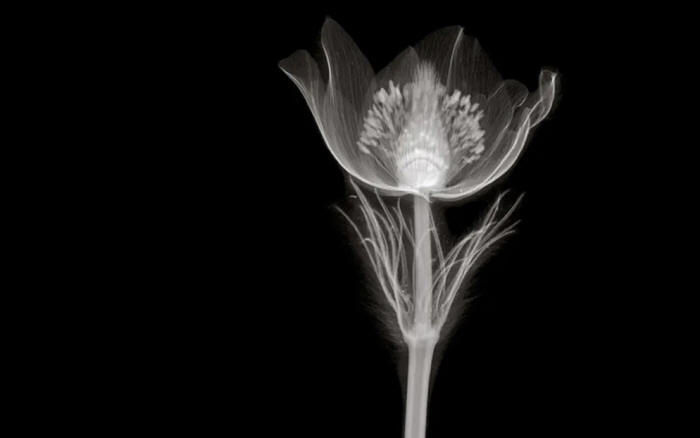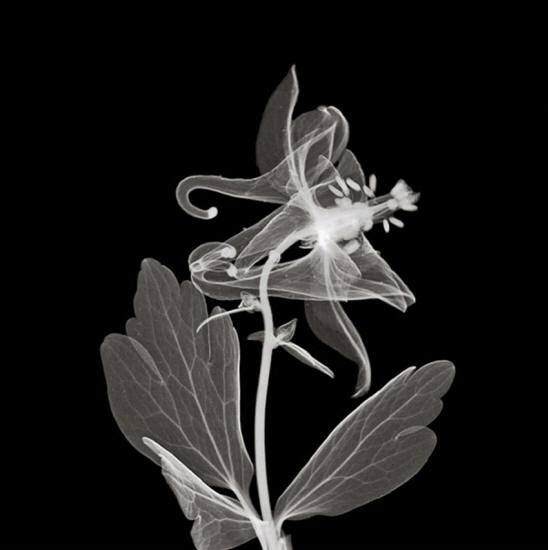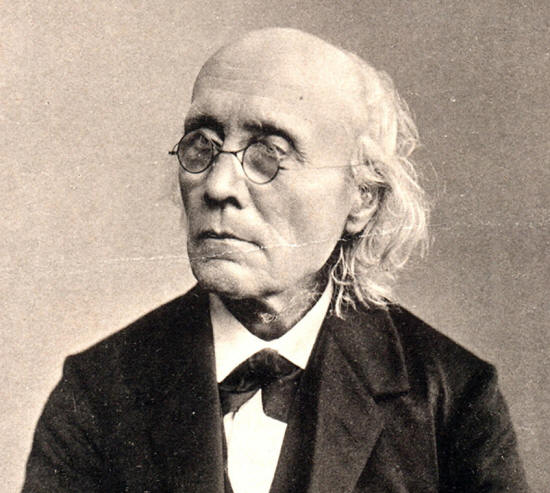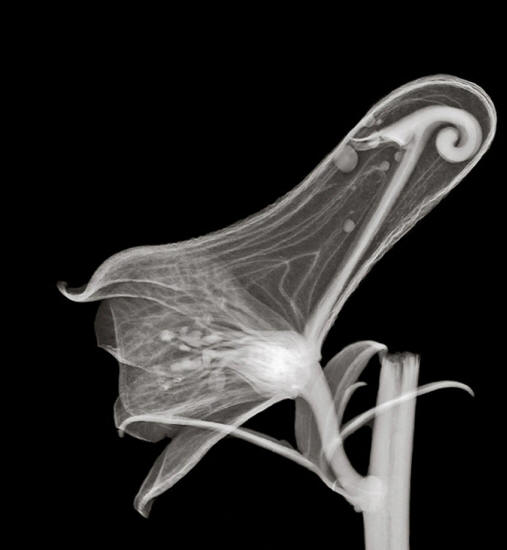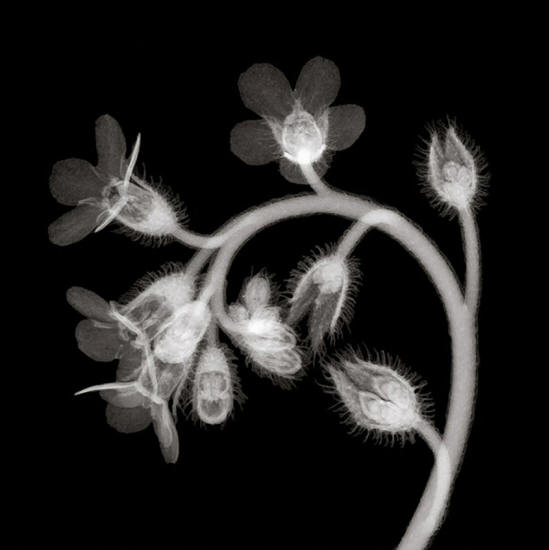|
by
Rachael Petersen
from
AEON
Website All images taken from Flora Norvegica Radiographica (2020) and courtesy Øyvind Hammer,
Natural History
Museum, University of Oslo the iconoclastic scientist Gustav Fechner made an inspired case for taking seriously the interior lives of plants...
I first learned of him in an interdisciplinary reading group on plant consciousness that I co-lead at Harvard University. We convene biologists, theologians, artists and ethologists to explore the burgeoning literature on plant life.
We found Fechner covered in the New York Times bestselling book by Christopher Bird and Peter Tompkins titled The Secret Life of Plants (1973).
Michael Pollan describes this book as a,
The Secret Life of Plants cites Fechner as an important but often forgotten champion for plant
sentience. In 2006, 30 years after The Secret Life of Plants (video), a bold group of scientists published an article calling to establish the field of 'plant neurobiology' with the goal of,
In other words, how plants might have something like minds.
The burgeoning field of plant science has become a rich playground for profound questions that have beguiled Western philosophy since Plato, namely,
While scientists increasingly agree that many animals are sentient, doubts remain about our vegetal kin.
For many, plants remain a limit case in the types of beings we are willing to concede experience life with the richness humans do, or whose experience we can meaningfully study.
European columbine (Aquilegia vulgaris)
Fechner, writing more than 150 years ago, anticipated many claims of the contemporary plant neurobiology movement. His thought stands like an oasis amid an intellectual history otherwise hostile to plants.
After all, in De Anima, Aristotle deemed plants the lowest form of life, construing them as defective animals.
Francis Bacon later construed science as a method of torturing nature. And René Descartes not only reduced animals to unthinking automata, but fundamentally ruptured the relationship between matter and mind.
Fechner would spend his whole life trying to heal the divide between mind and matter, and the commensurate split between philosophy and science - but, first, he had to go mad.
Fechner was born on 19 April 1801 in Groß Särchen, Saxony, the second child of Samuel Traugott Fischer and Dorothea Fechner.
Fechner's father Samuel was a pastor, and also the first person in the village to vaccinate his children. He installed a lightning rod on the church roof, and spoke Latin to his young son. He died when Gustav was only five.
At 16, Fechner matriculated into the University of Leipzig as a medical student.
Capitulating to this mechanical worldview, he abandoned medicine to study physics.
In February 1820, Fechner stumbled upon a copy of Grundriß der Naturphilosophie (1802) by Lorenz Oken, and,
The project of Naturphilosophie promised a great unified worldview, one that struck Fechner with urgent necessity.
Fechner could not, however, disavow his love of measurements, experiments and equations. Compared with physics, the sprawling top-down speculations of German idealism seemed insufficient.
Rigorous systematicity was the,
Fechner still longed to apprehend the invisible laws that caused creation to ring in his ears like a symphony.
Showing how brain stimulation affected bodily movement threatened to make notions of the 'soul' indefensible...
When Fechner was born, Germany was still a philosophical powerhouse.
Immanuel Kant, Johann Gottlieb Fichte, Friedrich Schelling and Johann Wolfgang von Goethe made the first three decades of the 19th century some of the most philosophically creative in modern history.
After G.W.F. Hegel died in 1831, major discoveries in biology, physiology and psychology laid the groundwork for an understanding of life in mathematical terms.
As the empirical sciences grew in prestige and authority, Ludwig Feuerbach, Carl Vogt, Ludwig Büchner and other thinkers argued that every living leaf, flower and fox could be explained by appeals to the physical and chemical properties of matter.
To some, 19th-century advances in psychology seemed to make philosophy obsolete.
The new field of psychology claimed to treat the mind - that old domain of philosophy - according to observational and increasingly quantitative methods.
Anatomical experiments showing how brain stimulation affected bodily movement threatened to make philosophical notions of the 'soul' indefensible.
Fechner embraced the standards of material, empirical observation even as he harboured a secret love of the dying Naturphilosophie.
He studied physics with greater intensity, and he accepted a physics professorship in 1834 at the University of Leipzig, and lectured without pay. To pay his bills, he translated multi-volume physics and chemistry works from French into German.
Desperate for work, the Latin-speaking doctor-turned-physicist found himself translating the eight-volume Hauslexikon, a 19th-century equivalent of the Ladies' Home Journal, many thousands of pages long. The tedium - the inanity - of Hauslexikon broke his spirit.
Fechner worked himself into exhaustion. He was also going blind.
Gustav Theodor Fechner. Courtesy Wikipedia
Inspired by Goethe's study of color, Fechner had conducted experiments into after-images by staring at the sun through tinted glasses.
His sight damaged, he retreated to a dark room and tied a cloth blindfold over his eyes. And when he could tolerate the pressure of the bandage no longer, a friend crafted custom goggles with thick lead cups to cover his eyes.
He sometimes walked about his garden, guided by his wife, with two black bulbs protruding from his sunken face. Pacing up and down rows of lilies and lilacs, perhaps he looked like a crazed, metallic bug.
The crisis lasted from December 1839 to October 1843.
Doctors treated him with therapies of the day - magnetism, vapors, electricity - to little success. The episode, which we might today characterize as depression, neurotic obsession and mania, would radically alter Fechner's life.
By 1843, the man who was once a voracious learner could not read. Fechner healed - slowly at first, then all at once.
He cites several factors:
The most significant moment of Fechner's recovery occurred on 5 October 1843, when he stepped out from his darkened room into his garden for the first time without his eye cover.
He suddenly caught,
The whole garden was transfigured.
And he thought to himself:
In 1846, at his first public lecture in six years, Fechner declared that his illness had ushered in a 'higher calling' of contemplating 'inner nature'.
He had crossed the bridge between inner and outer, to a place where the boundary between visible and invisible loses its meaning. Plant souls had rooted in Fechner.
He wanted to let them bloom and flower on the page, to exempt not even the tiniest weed.
He would spend the rest of his life inviting readers to cross over, and view nature with new eyes.
Wolf's bane (Aconitum lycoctonum)
Inspired by his vision, he wrote Nanna oder über das Seelenleben der Pflanzen ('Nanna, or On the Soul Life of Plants'), published in 1848.
The book draws from cutting-edge botanical experiments by Augustin Pyramus de Candolle, Matthias Jakob Schleiden, Hugo von Mohl and others, as well as Fechner's own close observation of plants.
In Nanna (named after the Norse goddess of flowers), Fechner argues that plants are conscious beings with feelings and desires. They delight in the sun as we might delight in a wholesome meal.
The world strikes plants with pleasure, pain, and even meaning.
Nanna asserts that we can only ever infer the existence of inner experience through outward physical expressions. And although we cannot fully know nature from within - e.g., we can never get inside the mind of a plant - we can get close through comparison.
We do this all the time, Fechner says.
We assume some shared inner experience when we gaze into the eyes of a lover, parent, friend or foe:
If you are like me, you must have a soul like me.
To those who say plants do not move, Fechner says that we simply lack the patience to observe their slowness...
The inherent interiority of things requires an endless process of approximation.
For this reason, Fechner's preferred rhetorical strategy is analogy. Fechner addresses the objection - popular then as now - that plants cannot have a mind because they lack a nervous system.
He contends that plants possess something analogous to animals' nervous systems, constituted by plant fibers and filaments. But he also questions why plants could not have subjective sensations without nerves.
Why grant the nervous system an exceptional status when it comes to the soul?
Nature seeks diverse means to achieve similar ends. The violin, for example, requires strings to intone. We might imagine the strings as nerves. But one would then conclude that a flute or trombone makes no sound because it lacks strings.
Animals might just be the,
Analogies are never perfect.
If they had to be, Fechner acknowledged, we would deny subjectivity to,
For Fechner, where analogies fall short, they instruct.
This is perhaps Fechner's most remarkable characteristic: his epistemological humility converts into a kind of ontological generosity.
To those who say plants do not move, Fechner says (as Charles Darwin did) that we simply lack the patience to observe their slowness.
To those who say plants lack speech, Fechner holds forth on a lexicon of fragrance, scent poured from chalice to chalice like great gossipy chatter:
So, that plants differ from humans and animals in structure and function does not prove they lack souls.
Rather,
Fechner imagines that plants could apply their own soul criteria to humans and find us lacking.
Plants may assume, based on their own experience, that the soul is evidenced by a capacity to self-generate and self-adorn, to create one's body leaf by leaf. But humans must 'leave our body as it is' and don external garments.
In addition, the plant is sessile; we run about.
To plants, we must look very soulless.
To Fechner, a soul is something with an interiority, a subjective awareness - an,
Tellingly, Fechner often uses soul (Seele) and mind (Geist) interchangeably as belonging to a being that experiences feelings (Empfindungen), including internal urges (Triebe) and external stimuli (Reize); intuition (Anschauung) and emotion (Gefühl).
Cast in modern terms, we might simply say a soul is the capacity for subjective experience - what some cognitive scientists call primary or phenomenal consciousness.
For Fechner, there is, as Thomas Nagel put it, 'something it is like' to be a plant.
Field forget-me-not (Myosotis arvensis)
For Fechner, a soul never exists independent of a body.
Physical form is the outward, sensible aspect of the soul, and the soul is the inward experience of form. In effect, body and soul are the same thing, viewed from different perspectives.
The contemporary philosopher of mind Peter Godfrey-Smith relies on experimental evidence to determine which creatures are conscious. Evidence has convinced Godfrey-Smith that octopuses, dogs and, more recently, bees have subjective experiences of reality, or what Fechner might have called soul.
While lecturing at Harvard, Godfrey-Smith cited a recent experiment that subjected octopuses to pain and concluded that it hurt them. In other words, there is 'something that it is like' to be a wounded octopus.
During the Q&A, a woman raised her hand.
With a kindness that suggested familiarity with this objection, Godfrey-Smith replied,
The reductive materialism that launched during Fechner's life continues its ascent and has long weakened our appetite to claim anything like a soul.
The prevailing scientific view is that consciousness emerges from complex networks of neurons - in other words, the mind is what the brain does. Consciousness is a property of neuronal traffic or perhaps even sophisticated computer code.
In The Claim of Reason (1979), his sweeping book on Ludwig Wittgenstein, Stanley Cavell provides a diagnosis of skepticism:
Increasing experimental evidence 'proves' that more animals satisfy scientific criteria for consciousness, and it is the vegetal kingdom that is becoming the stage on which skepticism plays out.
The incessant quest to know sidesteps the actual world, the real lives of others before us, radiant, waiting to be seen Cavell treats skepticism as a condition we reckon with, either productively or at great cost to ourselves and others.
Skepticism, for Cavell, expresses a discomfort with the finitude of life, and a resistance to accepting the world and acknowledging those with whom we share it. Bereft of transcendent absolutes, humans often reach to reason for the answer.
We convert an ontological problem into an epistemological one. When reason fails to deliver reality, we disavow ourselves of that reality.
The result is what Cavell calls 'soul-blindness', a condition in which the skeptic,
This blindness, he implies, is rooted in our inability to embrace exteriority as sufficient evidence of rich interiority:
Fechner might reply: not to believe there is such a thing as a human soul is not to know what the plant body is.
And not to believe there is such a thing as a plant soul is not to know what the human body is. In this way, soul-blindness may be inherently related to a widespread phenomenon that scientists term 'plant-blindness' - an inability of humans to see or notice plants in the environment.
Cavell's work is some of the most compelling in illuminating the tragic implications of skepticism on the life of the skeptic.
In the essay 'The Avoidance of Love' (1969), Cavell argues that skepticism drives the events in Shakespeare's King Lear. He understands Lear's inability to acknowledge what he already knows - that Cordelia loves him - as his inability to accept the human condition.
Lear, like the skeptical epistemologist in search of certain knowledge, loses the very presence he craves.
The incessant quest to know sidesteps the actual world, the real lives of others before us, radiant, waiting to be seen - winged, leafed, loving, destitute. In the end, the skeptic - like Gloucester in King Lear, like Fechner in a dark room - ends up eyeless, without direct access to the world.
The biologist E.O. Wilson characterized our current epoch of ecological extinction as the Eremocene - or age of loneliness.
I used to think he meant only the melancholy that accompanies silence where there should be birdsong. How could we not feel lonely as our metastasizing metropoles, branching roads and industrial agriculture kill off species at an unprecedented rate?
But maybe our species loneliness has as much to do with soul-blindness as our land-use policies. Skepticism fills Earth with mewing, howling, slithering ghosts - shadows of refused light.
We,
The tragedy of our times is the tragedy of Lear, says Cavell:
Many of the points Fechner makes in Nanna are now being made again, albeit with different evidence, by contemporary plant neurobiology researchers.
Like Fechner, these scientists reject a fetishisation of neurons (despite their name).
They carry on his claim that plants possess something analogous to animal brains - though, unlike Fechner, they often try to identify molecular-level functional similarities between animal and plant substrates.
Like Fechner, they argue that plant behaviour is intelligent - 'adaptive, flexible, anticipatory, and goal-oriented' - rather than simply hardwired instinct, as evidenced by experiments that document plant learning, kin recognition, communication.
Several scientists who support the cognitive capacity of plants also hold out the possibility that they are sentient - what Fechner called ensouled (beseelt).
A professor once remarked with a smirk to Fechner's nephew: if your uncle is so serious about his argument in Nanna, he must also, to be consistent, extend ensoulment to stars.
In fact, in his later three-volume treatise Zend-Avesta (1851), Fechner gives Nanna a cosmic upgrade, extending his analogical reasoning to celestial bodies.
All of creation harbored an interiority, a rich sensuous life, a kind of freedom.
And humans comprise, in part, this terrestrial consciousness. We rise upon the planet as wavelets rise upon the ocean. We grow out of her soil as leaves grow from a tree.
We are the sense organs of Earth's soul: when one of us dies, 'it is as if an eye of the world were closed,' as William James said in a lecture concerning Fechner's thought.
Zend-Avesta regards external creation (nature) and internal life (souls) as two aspects of the same reality.
All matter and spirit co-occur, co-instantiate, and cannot be separated.
Today, plant scientists who endorse the possibility of plant sentience face significant criticism...
Panpsychism, which holds that all things have a mind or mind-like quality, is an ancient theory.
And, in many ways, Fechner was a panpsychist, or perhaps a pantheist. For Fechner, 'belief in the plant soul is just a little instance' of broader questions regarding the animacy of the more-than-human world.
While it may be difficult to imagine mountains, rivers and stars as conscious - as Fechner later would - he saw plants as an accessible entry point into broader notions of mind.
He compared contemplating plant souls to a graspable pot handle:
Fechner's later books flopped.
None saw a second edition, and they remain untranslated. Colleagues dismissed Fechner's daring philosophy as a product of a mind gone wild, even as they lauded his earlier scientific work.
Fechner bemoaned that,
The US psychologist William James was one of Fechner's few champions.
James rhapsodized about Fechner:
James thought Fechner offered a corrective view, one that would,
Today, plant scientists who endorse the possibility of plant sentience face significant criticism.
In a 2021 article in the journal Protoplasma, critics called it 'regrettable' that,
These claims are,
One wonders what harm they think granting plants minds might cause - and if it is somehow more severe than the reverse.
Even today, as Fechner lamented,
In 1848, when Fechner's Nanna was published, a great darkness fell across Europe.
Revolutions spread. Germans fled on boats - fled with their families and few belongings to Galveston, to Cincinnati, to Milwaukee.
Fechner knew:
In short: who cared?
He begins the book with an apology:
Wars, a global pandemic, the climate crisis, the threat of AI, inflation, and the crushing heap of bodies - human and otherwise - murdered in the name of hate, conquest, greed.
But maybe that means a new vision is needed now more than ever. Maybe we must grip the pot with whatever small handle we can.
Of the failure of his books, Fechner expressed sadness but not worry.
He wrote in his diary:
Fechner reminds us that rigorous, scientific thinking need not be pitted against bold metaphysical claims.
He offers a way to attend to mystery without renouncing matter, and the inverse. Perhaps most of all, his life serves as a reminder that soul-blindness, and its attendant plant-blindness, carries risks.
He reminds me that the best way to apprehend the unseen in plants is to take off the blindfold and look.
He reminds me that what we stand to gain by looking at nature with new eyes is nothing short of the world, and nothing short of each other.
|


